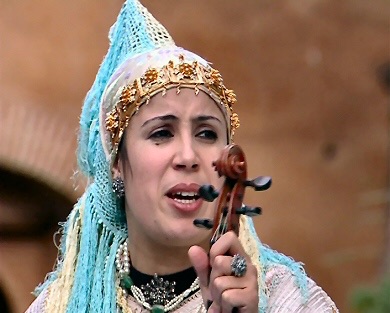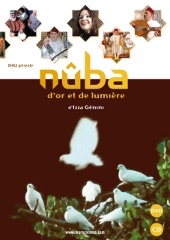Nûba d'or et de lumière
-
Réalisé par Izza Génini • Écrit par Izza Génini
-
Maroc, France • 2007 • 80 minutes • Beta digital • Couleur
- Réalisation :
Izza Génini - Écriture :
Izza Génini
- Production (structure) :
OHRA - Coproduction :
Sygma TV, Soread France / 2M Maroc - Participation :
Sacem - Ayant droit :
OHRA
- N° ISAN :
non renseigné
Résumé
Avec les plus éminents orchestres d’Al-Ala marocaine, accompagnés de solistes virtuoses, en cinq mouvements, nous découvrons comment, toutes générations, classes et religions confondues, la Nûba continue d’élargir le cercle de ses amateurs fervents. À l’image d’un arbre, les branches de cette musique sont nourries d’une sève qui, depuis quatorze siècles, monte des confins marocains et des courants venus d’Arabie, grandit dans les cours des califes andalous, se fortifie dans l’Espagne médiévale, se mêle au chant des trouvères et des Sépharades puis, replantée au Maghreb, s’épanouit au Maroc sous le nom d’El-Ala.
A story of Arabo-Andalusian music form of which Nuba could be seen as the symphonic form. In the image of a musical tree, its branches are nourished by a sap that, for the past 14 centuries, rose from the fringes of Morocco and currents of Arabia, grew in the courts of the Andalusian Caliphs, grew more robust in medieval Spain, melded with the songs of the troubadours and the Sephardics, then, replanted in the Maghreb, blossomed in Morocco under the name "el Ala". Birth. Apogee, Decline, the three phases of El andalus civilization, left their mark in the eastern muwashshah, Alfonso X’s cantigas of Santa Maria, in the Sephardic songs and the sanâa, the art of the nûba as it still exists around the Mediterranean. Dawn, Evening, Night inspires musicians and poets of the nuba imbued with the light of day, inhabited by human sentiments and temperaments, sustained by a public and artists who, from Tangiers to Tel Aviv, perform it in vibrant communion.
Comment avoir accès au film ?
- Édition DVD
-
Accès VOD
- Il n'existe pas d'accès en VOD à notre connaissance
- Distribution
- Aide sur les moyens d'accéder à un film

